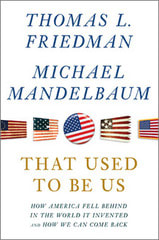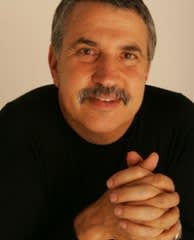Thomas Friedman On 'How America Fell Behind'
ベストセラー作家トーマス・フリードマンがアメリカの今を語る。
September 6, 2011
政治は国民以上ではありえない、結局国民が問われているということだろう。どこへ行きたいのか?と

That Used To Be Us
How America Fell Behind in the World It Invented and How We Can Come Back 如何にしてアメリカは自らこしらえた世界に遅れをとってしまたのか、そしてどうやって復活することができるのか
by Thomas L. Friedman and Michael Mandelbaum
September 6, 2011
Back in March, Paul Otellini — president and CEO of Intel Corp. — compared the situation of present-day America to that of the U.K. at the turn of the last century.
先の3月、ポール・オティニ(インテルのCEO)は現在のアメリカと20世紀末の英国の状況を比較してみせた。
"I imagine sitting in Britain 110 years ago, looking at the rising giant of the United States — the buildings going up and the new factories and the schools and the universities — and they must have been saying, 'Oh my god,' " he told NPR's Michele Norris. "And in fact, the U.S. eclipsed the U.K. and most of Europe. Well, we're sitting here today looking over the next ocean — the Pacific this time — and the infrastructure being built out in Asia ... and we should be appropriately saying, 'Oh my god.' "
「私は110年前のイギリスにいると想像してみる、巨大なアメリカが勃興しているのを見ながら・・・ビルが高くなり、それに新しい工場、学校や大学も・・・彼らは、こう言ったに違いない「オーマイ ゴッド!」そして、実際にアメリカはイギリスと欧州の大部分を蚕食していった。 今日我々はここにいて、大洋の向こうをみている・・・そう、今回は太平洋・・・そしてアジアにおいてインフラが建設されていく・・・・我々はいみじくもこう言っている「オーマイ ゴッド!」と」と彼はNPRのミッシェル・ノリスに話した。
"Oh my god" could have been the title of the new book by New York Times columnist Thomas Friedman and author Michael Mandelbaum. It's called That Used To Be Us and in it, Friedman and Mandelbaum describe a country that used to be industrially advanced, exceptionally inventive, unusually educated, politically pragmatic and relatively egalitarian.
「オーマイゴッド」はニューヨークタイムズのコラムニストであるトーマス・フリードマンと著者のミッシェル・マンデルバウムの新しい本のタイトルになるはずだった。 著書は、「ザット ユースト トゥビー アス(それはかつての私たちだった)」とタイトルが変わり、その中でフリードマンとマンデルバウムは、かつては産業が先進で、とほうもなく独創性があり、教育施策に優れ、地に足のついた政治そして、比較的公平な社会であった国を描いている。
"There's no question we've lost our way," Friedman tells NPR's Robert Siegel. "This problem started at the end of the Cold War. We made the biggest mistake a country and species can make: We misread our environment. We thought the Cold War was a victory and we could put our feet up. In fact, we had just unleashed ... 2 billion people just like us; people with our same aspirations, same capabilities. And just when we needed to be lacing up our shoes and running faster, we put our feet up."
「私たちが、自らの道を見失ったことは間違いありません。 この問題は冷戦の終焉とともに始まっていたのです。 私たちは国や種としとの人間が犯しやすい大きな過ちをしてしまったのです。 つまり環境を読み違えたということです。 私たちは冷戦に勝利したと思い、安逸を貪ってしまった。 事実、私たちは20億の人々をまさに私達と全く同様に解き放ってしまったのです、私たちと同じ野望、そして同じ能力を備えた人々にしてしまったのです。 そして我々が兜の緒を締めて、先陣を切らねばならないときに、私達は努力を怠ってしまったのです。」とフリードマンはNPRのロバート・シーゲルに話した。
The New American Generation 新しいアメリカの世代
So what happened? What changed? For one thing, Friedman says, the end of the Cold War saw the rise of a new American generation.
"We shifted from [the] greatest generation that really operated on what we call in the book 'sustainable values' — saving and investing — and we handed power over to the baby boomer generation who really lived by '' — borrow and consume," Friedman says. "The baby boomers, I believe, have a lot to answer for. They have not followed in the path of their parents in terms of making the hard decisions, making the long-term investments."
それで何が起こったか? 何が変わったか? 一つは、冷戦の終焉により新しいアメリカの世代の勃興を見たとフリードマンは言う。
「私たちは本のなかで言及した“継続的価値”なるもの・・・貯蓄と投資・・・に本当に影響を受けた世代から移り・・・借金して消費するということで、生きてきた次のベビーブーマーの世代へとバトンを引き継いでいったのです。 ベビーブーマーは多くのそれについての答えるべきものを持っていると私は考えます。彼らは、厳しい決断もせず、長期的な先行投資もしてこなかったという点で、彼らの両親の歩んだ道に従わなかった。
The end of the Cold War also led to a world that was not only connected, but hyperconnected. Friedman notes that the global connectivity he focused on in his book The World Is Flat has already grown by leaps and bounds since 2004, when he sat down to write it.
"Facebook didn't exist; Twitter was a sound; the cloud was in the sky; 4G was a parking place; LinkedIn was a prison; applications were what you sent to college; and Skype for most people was typo," he says. "All of that changed in just the last six years."
冷戦の終焉は世界を繫いだだけでなく、異常なほど繋いでしまった。 フリードマンは、彼の前著「フラット化する世界」で焦点を絞った地球的規模の結合は既に2004年のその著書の執筆を始めたときから、さらに大きく飛躍的に強まったと記している。
「当時はフェイスブックは無く、ツィッターといえば声だし、雲(クラウド)は空に浮いているものだし、4Gは駐車場だった、リンクトイン(繋がれる)は刑務所で、アプリ(申請書)は大学に送付するもので、スカイプに至っては殆どん人には印刷だった。 これらの変化の全ては、このたった6年で起きた変化です。」と彼は言う。

Thomas Friedman is the author of five best-selling books, including From Beirut to Jerusalem and The World Is Flat. トーマスフリードマンは5冊のベストセラーの著者で「ベイルートからエルサレムへ」や「フラット化する世界」の著書でも有名
Searching For Solutions 解決策を求めて
Globalization has meant that even wealthy, American-based businesses aren't contributing what they used to. American businesses used to actually be in the U.S., but today Friedman says, "they hover over America."
"We are missing the voices of those CEOs in our discussions — national discussions on education and infrastructure — because if they can't get the workers, the infrastructure, the opportunities that they need here, they can just go somewhere else," he says. "And that's a huge problem."
「グローバリゼーションは、富やアメリカ基盤のビジネスさえも、もはや、かつてのように貢献しなくなったことを意味している。 アメリカのビジネスは、かつてはアメリカの中に実際にあったが、それらはアメリカの上空に漂っている」と彼は言う
「私たちは我々の討論の中で、CEOのような人たちに声を逃している・・・そう、教育やインフラについての国民的な討論のなかで・・・なぜなら、もしこれら経営者が労働者やインフラやここで必要なチャンスを得られなかったら、彼らはどこか他所へ言ってしまうからです。 そしてそれは大変な問題です。」
Friedman has ideas for solutions, but they all start by addressing one thing — the current political gridlock in Washington.
フリードマンには解決のアイデアがあるが、しかし、それらは一つのことを述べることからまず始まる。・・・・・そう、それはワシントンにおける、今の政治的な手詰まり。
"We're having an economic crisis and the politicians are having an election and it's like they don't even overlap in many ways. The incentives of politics today — money, cable television, gerrymandered districts — are so misaligned with the needs of the country that they become like a closed circle, operating on their own," he says. "What we argue for is an independent, third party that actually can show that there is a huge middle in this country that demands different politics."
「我々は経済的な危機にあり、政治家は選挙を控えている、そしてそれらは多くの点で重なり合ってさえいないようにみえる。 今日の政治の動機付けは金(政治資金)、ケーブルテレビ(広報宣伝)、ゲリマンダー地区(有利な選挙区)であり、この国が必要とするものと整合性が全くずれており、彼らは閉鎖回路のように、彼ら自身のためにのみ動いている。 個人として我々が強く求めるものは、これまでとは違う政治を求める、大きなこの国の中間層をなす人々がいるということを示す第三の勢力なのです。
In other words, he wants to change today's political incentives.
いいかえれば、彼は今日の政治的なインセンティブを変えたいのです。
"Move the cheese; move the mouse. Don't move the cheese; mouse doesn't move," Friedman says. "So right now, all the incentives of these two parties are to behave in really bad ways for the country. The only way to change that is to show them the [voter] — the cheese — is over here."
「チーズを動かせば、ネズミはついてくる。 チーズを動かさないとネズミも動かない」とフリードマンは言う。 「なのし、今これら二つの政党の全てのインセンティブは、この国にとって本当に悪い方向に動くようになっている。 これを変える唯一の方法は彼等(政治家に)選挙民・・・チーズは・・こちらだよと示すことなのです。」とフリードマンは言う。
Read an excerpt of That Used To Be Us (次回にこの本の抜粋をアップします。)
ベストセラー作家トーマス・フリードマンがアメリカの今を語る。
September 6, 2011
政治は国民以上ではありえない、結局国民が問われているということだろう。どこへ行きたいのか?と

That Used To Be Us
How America Fell Behind in the World It Invented and How We Can Come Back 如何にしてアメリカは自らこしらえた世界に遅れをとってしまたのか、そしてどうやって復活することができるのか
by Thomas L. Friedman and Michael Mandelbaum
September 6, 2011
Back in March, Paul Otellini — president and CEO of Intel Corp. — compared the situation of present-day America to that of the U.K. at the turn of the last century.
先の3月、ポール・オティニ(インテルのCEO)は現在のアメリカと20世紀末の英国の状況を比較してみせた。
"I imagine sitting in Britain 110 years ago, looking at the rising giant of the United States — the buildings going up and the new factories and the schools and the universities — and they must have been saying, 'Oh my god,' " he told NPR's Michele Norris. "And in fact, the U.S. eclipsed the U.K. and most of Europe. Well, we're sitting here today looking over the next ocean — the Pacific this time — and the infrastructure being built out in Asia ... and we should be appropriately saying, 'Oh my god.' "
「私は110年前のイギリスにいると想像してみる、巨大なアメリカが勃興しているのを見ながら・・・ビルが高くなり、それに新しい工場、学校や大学も・・・彼らは、こう言ったに違いない「オーマイ ゴッド!」そして、実際にアメリカはイギリスと欧州の大部分を蚕食していった。 今日我々はここにいて、大洋の向こうをみている・・・そう、今回は太平洋・・・そしてアジアにおいてインフラが建設されていく・・・・我々はいみじくもこう言っている「オーマイ ゴッド!」と」と彼はNPRのミッシェル・ノリスに話した。
"Oh my god" could have been the title of the new book by New York Times columnist Thomas Friedman and author Michael Mandelbaum. It's called That Used To Be Us and in it, Friedman and Mandelbaum describe a country that used to be industrially advanced, exceptionally inventive, unusually educated, politically pragmatic and relatively egalitarian.
「オーマイゴッド」はニューヨークタイムズのコラムニストであるトーマス・フリードマンと著者のミッシェル・マンデルバウムの新しい本のタイトルになるはずだった。 著書は、「ザット ユースト トゥビー アス(それはかつての私たちだった)」とタイトルが変わり、その中でフリードマンとマンデルバウムは、かつては産業が先進で、とほうもなく独創性があり、教育施策に優れ、地に足のついた政治そして、比較的公平な社会であった国を描いている。
"There's no question we've lost our way," Friedman tells NPR's Robert Siegel. "This problem started at the end of the Cold War. We made the biggest mistake a country and species can make: We misread our environment. We thought the Cold War was a victory and we could put our feet up. In fact, we had just unleashed ... 2 billion people just like us; people with our same aspirations, same capabilities. And just when we needed to be lacing up our shoes and running faster, we put our feet up."
「私たちが、自らの道を見失ったことは間違いありません。 この問題は冷戦の終焉とともに始まっていたのです。 私たちは国や種としとの人間が犯しやすい大きな過ちをしてしまったのです。 つまり環境を読み違えたということです。 私たちは冷戦に勝利したと思い、安逸を貪ってしまった。 事実、私たちは20億の人々をまさに私達と全く同様に解き放ってしまったのです、私たちと同じ野望、そして同じ能力を備えた人々にしてしまったのです。 そして我々が兜の緒を締めて、先陣を切らねばならないときに、私達は努力を怠ってしまったのです。」とフリードマンはNPRのロバート・シーゲルに話した。
The New American Generation 新しいアメリカの世代
So what happened? What changed? For one thing, Friedman says, the end of the Cold War saw the rise of a new American generation.
"We shifted from [the] greatest generation that really operated on what we call in the book 'sustainable values' — saving and investing — and we handed power over to the baby boomer generation who really lived by '' — borrow and consume," Friedman says. "The baby boomers, I believe, have a lot to answer for. They have not followed in the path of their parents in terms of making the hard decisions, making the long-term investments."
それで何が起こったか? 何が変わったか? 一つは、冷戦の終焉により新しいアメリカの世代の勃興を見たとフリードマンは言う。
「私たちは本のなかで言及した“継続的価値”なるもの・・・貯蓄と投資・・・に本当に影響を受けた世代から移り・・・借金して消費するということで、生きてきた次のベビーブーマーの世代へとバトンを引き継いでいったのです。 ベビーブーマーは多くのそれについての答えるべきものを持っていると私は考えます。彼らは、厳しい決断もせず、長期的な先行投資もしてこなかったという点で、彼らの両親の歩んだ道に従わなかった。
The end of the Cold War also led to a world that was not only connected, but hyperconnected. Friedman notes that the global connectivity he focused on in his book The World Is Flat has already grown by leaps and bounds since 2004, when he sat down to write it.
"Facebook didn't exist; Twitter was a sound; the cloud was in the sky; 4G was a parking place; LinkedIn was a prison; applications were what you sent to college; and Skype for most people was typo," he says. "All of that changed in just the last six years."
冷戦の終焉は世界を繫いだだけでなく、異常なほど繋いでしまった。 フリードマンは、彼の前著「フラット化する世界」で焦点を絞った地球的規模の結合は既に2004年のその著書の執筆を始めたときから、さらに大きく飛躍的に強まったと記している。
「当時はフェイスブックは無く、ツィッターといえば声だし、雲(クラウド)は空に浮いているものだし、4Gは駐車場だった、リンクトイン(繋がれる)は刑務所で、アプリ(申請書)は大学に送付するもので、スカイプに至っては殆どん人には印刷だった。 これらの変化の全ては、このたった6年で起きた変化です。」と彼は言う。

Thomas Friedman is the author of five best-selling books, including From Beirut to Jerusalem and The World Is Flat. トーマスフリードマンは5冊のベストセラーの著者で「ベイルートからエルサレムへ」や「フラット化する世界」の著書でも有名
Searching For Solutions 解決策を求めて
Globalization has meant that even wealthy, American-based businesses aren't contributing what they used to. American businesses used to actually be in the U.S., but today Friedman says, "they hover over America."
"We are missing the voices of those CEOs in our discussions — national discussions on education and infrastructure — because if they can't get the workers, the infrastructure, the opportunities that they need here, they can just go somewhere else," he says. "And that's a huge problem."
「グローバリゼーションは、富やアメリカ基盤のビジネスさえも、もはや、かつてのように貢献しなくなったことを意味している。 アメリカのビジネスは、かつてはアメリカの中に実際にあったが、それらはアメリカの上空に漂っている」と彼は言う
「私たちは我々の討論の中で、CEOのような人たちに声を逃している・・・そう、教育やインフラについての国民的な討論のなかで・・・なぜなら、もしこれら経営者が労働者やインフラやここで必要なチャンスを得られなかったら、彼らはどこか他所へ言ってしまうからです。 そしてそれは大変な問題です。」
Friedman has ideas for solutions, but they all start by addressing one thing — the current political gridlock in Washington.
フリードマンには解決のアイデアがあるが、しかし、それらは一つのことを述べることからまず始まる。・・・・・そう、それはワシントンにおける、今の政治的な手詰まり。
"We're having an economic crisis and the politicians are having an election and it's like they don't even overlap in many ways. The incentives of politics today — money, cable television, gerrymandered districts — are so misaligned with the needs of the country that they become like a closed circle, operating on their own," he says. "What we argue for is an independent, third party that actually can show that there is a huge middle in this country that demands different politics."
「我々は経済的な危機にあり、政治家は選挙を控えている、そしてそれらは多くの点で重なり合ってさえいないようにみえる。 今日の政治の動機付けは金(政治資金)、ケーブルテレビ(広報宣伝)、ゲリマンダー地区(有利な選挙区)であり、この国が必要とするものと整合性が全くずれており、彼らは閉鎖回路のように、彼ら自身のためにのみ動いている。 個人として我々が強く求めるものは、これまでとは違う政治を求める、大きなこの国の中間層をなす人々がいるということを示す第三の勢力なのです。
In other words, he wants to change today's political incentives.
いいかえれば、彼は今日の政治的なインセンティブを変えたいのです。
"Move the cheese; move the mouse. Don't move the cheese; mouse doesn't move," Friedman says. "So right now, all the incentives of these two parties are to behave in really bad ways for the country. The only way to change that is to show them the [voter] — the cheese — is over here."
「チーズを動かせば、ネズミはついてくる。 チーズを動かさないとネズミも動かない」とフリードマンは言う。 「なのし、今これら二つの政党の全てのインセンティブは、この国にとって本当に悪い方向に動くようになっている。 これを変える唯一の方法は彼等(政治家に)選挙民・・・チーズは・・こちらだよと示すことなのです。」とフリードマンは言う。
Read an excerpt of That Used To Be Us (次回にこの本の抜粋をアップします。)









